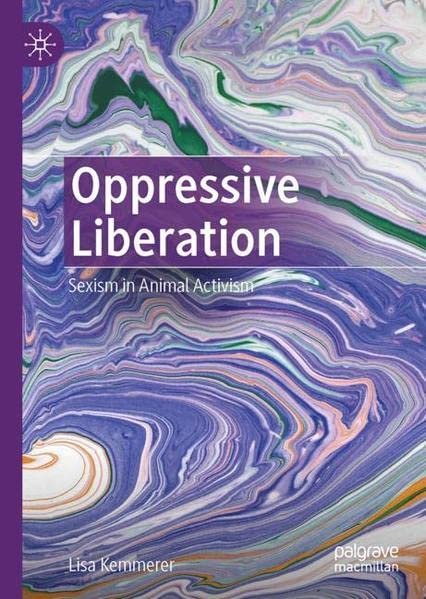Oppressive Liberation
Oppressive Liberation
Available at:
ISBN : 3031153626
Publisher: Palgrave Macmillan (September, 2023)
In this latest book, Lisa Kemmerer details the entrenchment of sexism in elements of the animal advocacy movement. Drawing on survey findings and written accounts of animal advocates, Kemmerer exposes many intra-movement problems and challenges the movement to engage in a process of truth and reconciliation, rightfully pointing out that the goals of anti-speciesism cannot be realized without also addressing sexism and other forms of intersecting oppression.
Amy J. Fitzgerald, Professor, University of Windsor, Canada
This powerful and provocative book is essential reading for anyone studying or participating in social movements.
Emily Gaarder, Associate Professor, University of Minnesota Duluth, USA
Important, compelling, and provocative, Oppressive Liberation is a long overdue intervention in the problematic gender politics of the anymal rights movement. The book is an urgent reminder that the anymal rights movement has not yet sorted out its responsibilities to feminism or any other social justice issue. Kemmerer draws a much-needed roadmap for moving forward in ways that reject harassment, discrimination, and violence and create healthier, more secure, and more just organizational cultures in the anymal rights movement.
Katja M. Guenther, Professor, University of California, Riverside, USA
While explicitly set against a backdrop of sexism in social justice activism more generally, this book exposes causes, pervasiveness, harms, and possible directions for change with regard to sexism and male privilege in the animal activist movement.
Employing the work of previous scholars, Dr. Lisa Kemmerer exposes the commonplace nature and causes of sexism and male privilege in social justice activism, then focuses on anymal activists, including new data that has not previously been published. The book also explores the crushing harms caused by sexism in the movement and an extensive array of possible directions for change. In various places throughout the text, Kemmerer refocuses on the interface of sexism and speciesism, and one full chapter explores a philosophies of interconnection from around the world and down through time. Also included are six essays from contributing authors who offer fresh angles on the topic, and who provide contextualized experiences with intersectional oppressions. While the book focuses specifically on animal activism, the end-goal of the book is total liberation―an end to all forms of privilege and marginalization.
Kemmerer Survey on Harassment and Discrimination in the Anymal Activist Community
Oppressive Liberation
Introduction by Lisa Kemmerer
Introduction: Speciesism, Sexism, and Male Privilege
Serial killer Robert Pickton of Canada was first identified as a violent criminal by a victim/survivor who showed up in an emergency room “with serious stab wounds and handcuffs still attached to her wrist.” She named Pickton as the man who had “stabbed her and tried to handcuff her at his pig farm” (Lee and Reid 47, 49), an incident from which she narrowly escaped “naked, with a handcuff dangling from a wrist” (MacQueen n.p.). Pickton showed up in the same emergency room on that same night and was treated “for stab wounds received during a prolonged knife fight” (Lee and Reid 49). “The two were treated in adjoining operating rooms,” so medical professionals were able to acquire—from Pickton’s clothes— the keys to the handcuffs that were on the wrist of the victim/survivor (Lee and Reid 49).
Medical professionals turned all evidence over to the police, including Pickton’s bloody clothing (Joyce n.p.). Despite this compelling evidence, “police and prosecutors declined to pursue criminal charges,” resting their decision on the well-known fact that the victim/survivor “was a sex worker with a long history of drug abuse”—who had been using drugs that very day (Lee and Reid 49; also Joyce n.p. and MacQueen n.p.). Perhaps “Pickton remained above suspicion largely because of a refusal by the senior ranks of the Vancouver Police and the RCMP to believe that women were systematically being murdered” (MacQueen n.p.). But they were, and though the police held the evidence in their hands, and though “Pickton’s bloody clothing from the 1997 stabbing held the key, literally and figuratively, to solving both past and future murders,” the items “weren’t tested for DNA until 2004,” after he had murdered many more women (MacQueen n.p.). When they did finally test the evidence, the “results revealed the DNA of two women who vanished in early 1997” (MacQueen n.p.). They had the murderer, but chose to turn him loose because of who his victim was. Yet more evidence against Pickton emerged a couple of years after the incident in the hospital: Visitors and neighbors reported that “Pickton had a stash of women’s purses” and their ID cards, and that a woman’s body was seen hanging in the slaughter barn (MacQueen n.p., also Butts N.p.). Despite all of this evidence, Pickton’s serial killing went unchallenged for years “because the women’s low social status made them a lesser priority” (MacQueen n.p.).
At face value, it is remarkable that police would drop a murder case with such strong evidence in hand, provided by medical professionals, supported by tips from various others, simply because of the employment and habits of the victim/survivor. But that is exactly what happened, suggesting that all life is not equally protected. Even human life. If the victim/survivor had been as privileged and empowered as the men on the police force, would Pickton have been released back into the night, as if a woman wearing handcuffs and riddled with stab wounds had not accused him of attempted murder? If law enforcement were largely women (those at risk from the hands of men like Pickton), would they have pursued the case rather than return someone accused of such deeds back onto the streets—and back to the pig farm? . . . Read more
© The Author(s), under exclusive license to Springer Nature
Switzerland AG 2023
L. Kemmerer, Oppressive Liberation, https://doi.org/10.1007/978-3-031-15363-1_1
